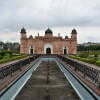Farmers in crisis as tea estate diverts canal's course

The Baromasia canal in Chattogram's Fatikchhari upazila is on the brink of drying up after the Halda Valley Tea Estate altered its course at several points to facilitate irrigation for its tea garden.
The modifications have completely halted the canal's water flow, severely impacting over 3,000 farmers who rely on it for irrigation, especially during the dry season.
Connected directly to the Halda River, the Baromasia canal channels freshwater from hilly areas, supporting Bangladesh's only natural breeding ground for major carps. It plays a crucial role in sustaining a healthy freshwater ecosystem and supplying carp fries to fish cultivators nationwide.
However, the extensive diversion of the canal has triggered a severe irrigation crisis, threatening both local livelihoods and the environment.
The Halda Valley Tea Estate is currently extracting water at three separate points using heavy pumps -- an act that violates the Water Act 2013 and is punishable under the law.

"The Tea Estate has been extracting water from the canal since 2007. Now, they have altered its course at multiple points," said Sohag Talukder, sub-divisional engineer of the Water Development Board (WDB) in Chattogram.
"Both altering a stream's course and unilaterally extracting water from a natural canal are legal violations, and action will be taken against the violators," he added.
During a visit to the area on March 15, this correspondent observed that approximately two kilometers of the canal -- stretching from Joy Nagar to Edilpur -- had dried up, leaving several paddy fields parched due to the lack of water.

In 1980, the WDB built a water retention structure on the canal to irrigate over 3,000 acres of land across two unions during the Boro season.
This enabled farmers to grow three crops a year instead of just one, benefiting nearly 10,000 people and increasing paddy production by 7,000 tonnes annually.
That initiative is now on the verge of collapse. Due to the water crisis, cultivation has ceased on at least 2,500 acres of land.
Fatikchhari Upazila Agriculture Officer Hasanuzzaman said due to insufficient irrigation, farmers have only been able to cultivate Bora on 500 acres.
"With the dry season setting in, the tea garden authorities altered the canal's course, causing rice seedlings to die from lack of water," he added.
For generations, farmers have cultivated three crops annually along the fertile land surrounding the canal. Now, they can barely grow one.

Many have been forced to seek alternative livelihoods, such as daily labour.
"For the past few years, we haven't been able to grow Boro paddy due to the irrigation crisis," said Mohammad Musa, a farmer from Edilpur village, who now works in brick kilns as a day labourer.
Fayezur Rahman, another farmer from Mirzahat, shared a similar experience. "I used to cultivate paddy on two acres of land, but now my fields are dry. We are helpless as the canal has no water," he said.
To prevent further water extraction, the WDB sent a notice to the Halda Valley Tea Estate on March 13. The Daily Star obtained a copy of the notice.
Fazlul Karim, president of the Baromasia Canal Irrigation Project, stated, "We are not against the tea garden, but the canal is dying due to their unplanned activities."
He urged the estate to preserve the canal in its natural state to protect both agriculture and the environment.
Farmers have also called on local authorities to take legal action against the tea estate.
Sowkat Ibne Sahid, executive engineer of the WDB in Chattogram, said, "We sought help from the upazila administration to take action against the tea state to stop the destructive activities."
Contacted, Mozammel Hoque Chowdhury, upazila nirbahi officer (UNO) of Fatikchhari, said, "If the Halda Valley Tea Estate is found to have violated the law, legal action will be taken."
Meanwhile, Nader Khan, owner of the Halda Valley Tea Estate, denied the allegations of altering the canal's course.
"We need water to operate the tea gardens, but the claim of extracting water unilaterally is completely false," he said.
However, he added, "Since a complaint has been made, I will advise the garden's manager to extract water only after discussing it with the farmers."

 For all latest news, follow The Daily Star's Google News channel.
For all latest news, follow The Daily Star's Google News channel. 








Comments